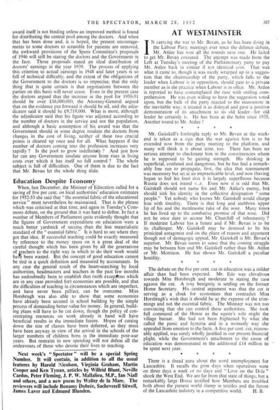Education Despite Economy
When, last December, the Minister of Education called for a saving of five per cent. on local authorities' education estimates for 1952-53 she said that "the essential fabric, of the educational service" must nevertheless be maintained. That is the phrase which was criticised at that time, and again in Tuesday's Com- mons debate, on the ground that it was hard to define. In fact a number of Members of Parliament quite evidently thought that the figures of Government expenditure on education were a much better yardstick of success than the less materialistic standard of the "essential fabric?: It is hard to see where they • got that idea. If successful teaching could be exactly measured by reference to the money spent on it a great deal of the careful thought which has been given by all the generations of leachers to the right way in which to do their work would haJe been wasted. But the concept of good education cannot be tied in a quick definition and measured by accountants. In any case the general result of the heart-searching by local authorities, headmasters and teachers in the past few months has undoubtedly been to establish that (with excepttons which are in any case provided for) economies are possible, and that the difficulties of teaching in circumstances which are imperfect, and have never been peliect, can be overcome. Miss Horsbrugh was also able to show that some economies have already been secured in school building by the simple process of demanding better value for money. In general, build- ing plans will have to be cut down, though the policy of con- centrating resources on work already in hand will have beneficial results in the immediate future. Hopes of cutting down the size of classes have been deferred, as they must have been anyway in view of the arrival in the schools of the larger numbers of children born in the immediate post-war years. But restraint in new spending will not defeat all the endeavours of those who devote their lives to teaching.


































 Previous page
Previous page